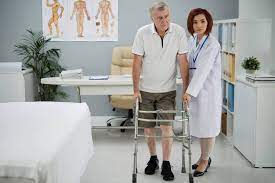
HOW TO EARLIER RECOVER BED RIDDEN PATIENT AND THERE MANAGEMENT
Difficulties Faced by Family Caregivers
- Physical Strain: Providing constant care for a bedridden patient can be physically demanding.
- Emotional Stress: Watching a loved one suffer or dealing with uncertainty can lead to emotional strain.
- Financial Burden: Costs of medical supplies, equipment, and caregiving support can create financial strain.
- Social Isolation: Caregiving responsibilities may limit engagement in social activities, leading to isolation.
- Conflict and Relationship Strain: Stress of caregiving can lead to tension or disagreements among family members.
- Fatigue and Burnout: Demands of caregiving can result in physical and emotional exhaustion.
- Limited Personal Time: Caregiving duties may consume much of a family member's time.
- Navigating Healthcare Systems: Understanding medical terminology and managing paperwork can be overwhelming.
- Coping with Uncertainty: Dealing with uncertainty about the patient's prognosis can be emotionally challenging.
- Balancing Multiple Responsibilities: Juggling caregiving with work and other obligations can lead to overwhelm.
Recovery Tips for Bedridden Patients
- Medical Care: Ensure proper medical attention and medication as prescribed.
- Positioning: Regularly change the patient's position to prevent bedsores and promote circulation.
- Physical Therapy: Encourage gentle exercises and movements to prevent muscle atrophy and improve mobility.
- Nutrition: Provide a balanced diet rich in nutrients to support healing and maintain strength.
- Hydration: Ensure the patient stays hydrated by providing ample fluids unless contraindicated.
- Emotional Support: Offer companionship, encouragement, and reassurance for mental well-being.
- Comfort: Keep the patient comfortable with appropriate bedding, pillows, and temperature control.
- Communication: Keep the patient engaged and informed about their condition, treatment plan, and progress.
- Assistive Devices: Use assistive devices such as bed rails, grab bars, or mobility aids as needed.
- Follow-up Care: Attend follow-up appointments with healthcare providers to monitor progress and adjust treatment plans.
Dr. Ramesh R. Khandare (M.S General Surgery)

